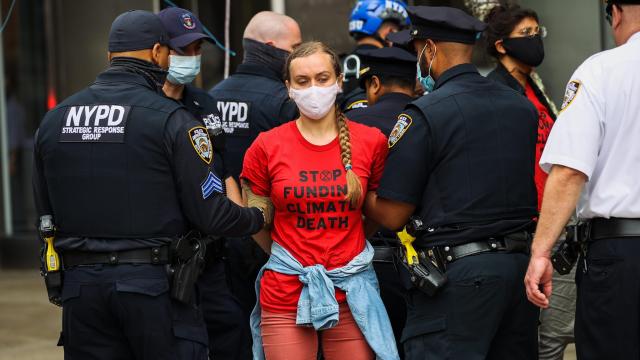Surprise, surprise, the people who are the most affected by the climate crisis in the U.S. are the ones who are more likely to put their bodies on the line to change bad climate policy.
New polling from the Yale Program on Climate Communication asked participants if they were willing to engage in civil disobedience. The responses show a stark generational and racial divide.
The poll specifically asked respondents if they would “support an organisation engaging in non-violent civil disobedience against corporate or government activities that make global warming worse and about their willingness to personally engage in such non-violent civil disobedience themselves.”
A third of millennials and younger adults (18 to 40 years old) said they would support organisations engaging in non-violent civil disobedience as did a third of Latinx and Black respondents. In comparison, less than a quarter of Baby Boomers and a quarter of white respondents felt the same. A higher number of young people and people of colour were also willing to engage in direct action themselves.
The gap illustrates who feels the climate crisis most urgently. Communities of colour are often pummelled by environmental racism and on the frontlines of climate disasters. It affects everything from public health, mental health, and even long term financial outcomes for young people and communities of colour. The luxury to act as if the climate crisis is out of sight and out of mind doesn’t exist when it and environmental racism are part of everyday life.
A study released in 2019 found that Hispanic and Black communities are consistently exposed to more pollution than they actually produce. Scientists were able to calculate that Hispanics breathe in 60% more pollution than their communities create while Black Americans are exposed to 50% more pollution than they create. On the other end of the spectrum, most white Americans are exposed to about 17% less pollution than they produce.
The aftermath of natural disasters connected to the climate crisis is also a hotbed for stark disparities for communities of colour throughout the country. A 2020 report from Princeton University about racial disparities and the climate crisis found that communities of colour saw their overall wealth go down after a disaster while predominantly white communities did not.
“White counties saw an increase in average wealth after natural disasters while predominantly minority counties saw a wealth decrease….white communities saw higher levels of reinvestment in their communities after natural disasters in comparison to their minority counterparts,” the study explained.
Low income communities of colour are also a lot more likely to live near sites of high polluting industries (which increases their chances of struggling with asthma), and are more likely to live near floodplains which explains their high levels of exposure and higher levels of climate anxiety.
Younger generations like millennials and Gen Z are more likely to be worried about climate issues because decisions made today will define their lives. With avenues to holding higher office and changing policies that way being a career path, civil disobedience can offer a fast track for changing the world’s current trajectory.
Recent events show us that people of colour and young activists aren’t just saying that they’ll support and participate in civil disobedience; they’re turning out now. Indigenous- and Black-led pipeline protests have become major battlegrounds for the future of the climate. A recent analysis found Indigenous protesters have succeeded blocking enough fossil fuel infrastructure to stave off 779 million metric tons of carbon pollution.
Young adults have also been at the forefront, including massive climate strike that roiled the world starting in 2019 and continuing even in the face of the pandemic. The Sunrise Movement has also galvanised young adults across the U.S. This past October, young activists with the group staged a hunger strike to demand that Democrats in Congress pass meaningful climate legislation. (Young adults also surrounded Sen. Joe Manchin’s Maserati in an attempt to get him to listen to their stories and stop his obstruction.)
Several of the hunger strikers became ill and an activist was hospitalized as a result. Yet they told Earther at the time that they felt it was worth putting their health on the line for a better more sustainable future.
“We’re fighting for our survival, and we’re fighting to live,” activist and striker Ema Govea said.
It appears they may soon have backup if the new polling is any indication.
